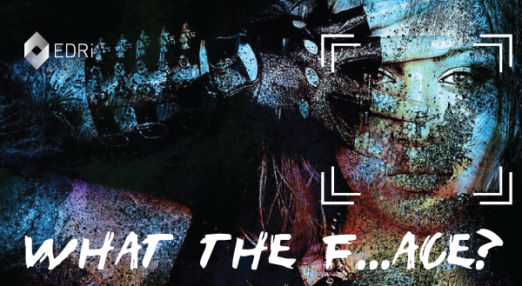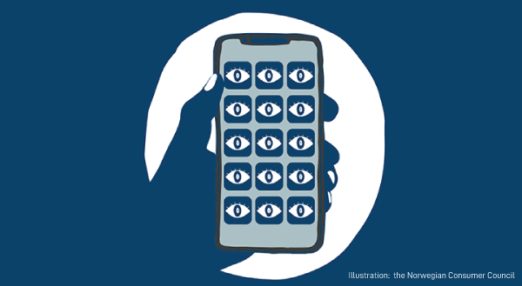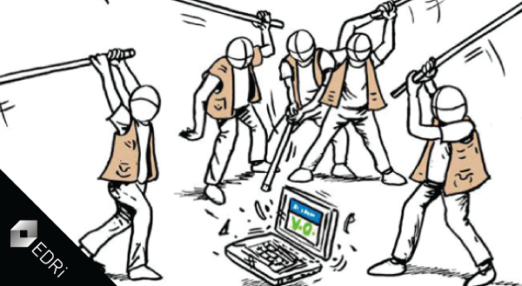Our work
EDRi is the biggest European network defending rights and freedoms online. We work to to challenge private and state actors who abuse their power to control or manipulate the public. We do so by advocating for robust and enforced laws, informing and mobilising people, promoting a healthy and accountable technology market, and building a movement of organisations and individuals committed to digital rights and freedoms in a connected world.
Filter resources
-

Your face rings a bell: Three common uses of facial recognition
Not all applications of facial recognition are created equal. In this third installment, we sift through the hype to analyse three increasingly common uses of facial recognition: tagging pictures on Facebook, automated border control gates, and police surveillance.
Read more
-

Our New Year’s wishes for European Commissioners
EDRi wishes all readers a happy new year 2020! In 2019, we had a number of victories in multiple fields. The European Parliament added necessary safeguards to the proposed Terrorist Content Online (TCO) Regulation to protect fundamental rights against overly broad and disproportionate censorship measures. The Court of Justice of the European Union (CJEU) ruled […]
Read more
-

Indiscriminate data retention considered disproportionate, once again
EDRi’s initial reaction on the press release of the AG Opinion on data retention Today’s Court of Justice of the European Union (CJEU) Advocate General’s Opinions continue the firmly established case-law of the CJEU considering mass collection of individuals communications data incompatible with EU law. The Advocate General reaffirms that blanket retention of telecommunication data […]
Read more
-

NCC Report: Online advertising industry is out of control
Today, on 14 January 2020, the Norwegian Consumer Council (NCC), a consumers group active on the field of digital rights, denounces in their report “Out of Control” current practices of the adtech industry, including systematic privacy breaches and unlawful behavioural profiling. The report focuses on the analysis of data traffic from ten popular apps such […]
Read more
-

Austrian government hacking law is unconstitutional
On 11 December 2019, the Austrian Constitutional Court decided that the surveillance law that permits the use of spying software to read encrypted messages violates the fundamental right to respect for private life (article 8 ECHR), the fundamental right to data protection (§ 1 Austrian data protection law) and the constitutionally granted right that prohibits unreasonable searches (Art 9 Austrian bill of rights – Staatsgrundgesetz).
Read more
-

Bits of Freedom celebrates its 20th anniversary
EDRi member Bits of Freedom celebrates its 20 year anniversary. Bits of Freedom believes an open and just society is only possible when people can participate in public life without fear of repercussions. For this, every person needs to be free to share information and their private life needs to be respected. The right to […]
Read more
-

Online content moderation: Where does the Commission stand?
The informal discussions (trilogues) between the European Parliament, the Council of the European Union and the European Commission are progressing on the Terrorist Content Regulation (TCO, aka “TERREG”). While users’ safeguards and rights-protective measures remain the Parliament’s red lines, the Commission presses the co-legislators to adopt what was a pre-elections public relations exercise, rather than […]
Read more
-

The many faces of facial recognition in the EU
In this second installment of EDRi's facial recognition and fundamental rights series, we look at how different EU Member States, institutions and other countries worldwide are responding to the use of this tech in public spaces.
Read more
-

Spain: New law threatens internet freedoms
On 5 November 2019, the Royal Decree-Law 14/2019 that had been adopted on 31 October was published in the Spanish Official State Gazette (BOE). This was just five days before the general elections that would take place on 10 November, under an undefined “exceptionality and urgency”, and justified by the “challenges posed by new technologies […]
Read more
-

Say “no” to cookies – yet see your privacy crumble?
Cookie banners of large French websites turn a clear “no” into “fake consent”. EDRi member noyb has filed three General Data Protection Regulation (GDPR) complaints with the French Data Protection Regulator (CNIL).
Read more
-

Casual attitude in intelligence sharing is troubling
A recent report by Dutch Military Intelligence and Security Service CTIVD shows that the Dutch secret services regularly violate the law when sharing intelligence with foreign services. For the sake of privacy and freedom of communication, it is crucial that data sharing safeguards are both tightened and more strictly enforced.
Read more
-

Letter to Member States calls for safeguards in Terrorist Content Regulation
On 16 December 2019, EDRi and Access Now sent a letter to EU Member States urging them ensure key safeguards on the proposed Regulation regarding the removal orders, the cross border mechanism and crucial exceptions for education, journalistic and research materials in the ongoing trilogue discussions. This letter is another step in the work that […]
Read more
